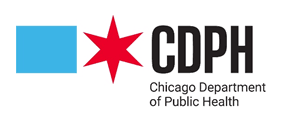Chicago Department of Public Health Weekly Media Brief, 04/11/2024
CDPH Public Information Office: media.cdph@cityofchicago.org

Measles on the Decline
The Chicago Department of Public Health and its partners have now administered about 14,000 measles-mumps-rubella (MMR) vaccines since the first case of measles was identified in Chicago in March, and many of those people are now receiving second doses on an expedited schedule to better ensure their protection and contain spread of the highly infectious virus. CDPH and partners are also responding by facilitating appropriate testing and ensuring people are connected to care and isolating from others while infectious.
With all of these efforts in place, the City has seen a significant decline in new cases - CDPH has identified just three new cases this week, bringing Chicago up to 61 confirmed cases of measles, the majority of which have been associated with the Pilsen new arrivals shelter on Halsted Street. The CDPH measles dashboard now features a vaccinations section, showing how many doses of the MMR vaccine have been administered each day in 2024.
CDPH has hosted over 100 MMR vaccine events at new arrival shelters since the beginning of March and continues to provide MMR vaccinations at the City's landing zone for those who need them. Of the 61 confirmed cases, 33 are in children below the age of 5, underscoring the critical importance of childhood vaccination in fighting the spread of this highly infectious disease.
The MMR vaccine is available at most doctor's offices and pharmacies, and is very safe and effective. Two doses of MMR vaccine are about 97% effective at preventing measles; one dose is about 93% effective. Illinois children as young as 7 years old can get vaccinated at pharmacies under Illinois law. CDPH Immunization clinics provide MMR vaccine for no out-of-pocket cost to any child 0-18 years and uninsured adults 19 and older. Immunization records recorded in the Illinois immunization registry can be accessed using the Illinois Department of Public Health Vax Verify portal. For more information on measles please visit the CDPH website.
Mayor Johnson To Celebrate Tree Planting Season with the White Sox
Mayor Brandon Johnson, City leaders and community partners will join CDPH and the Chicago White Sox next Tuesday, April 16, for a celebratory tree planting in Armour Square as part of the Our Roots Chicago tree equity initiative. The program has grown since its launch in 2021, planting more than 41,000 trees since 2022, and the collaboration with the White Sox is a home run for Chicago as we look to create a healthier, more equitable city.
For more information about the tree planting event, email grace.adams@cityofchicago.org. For more information about the program or to request a free parkway tree, visit chicago.gov/ourroots.
STI Awareness Week
Did you know that on any given day, approximately 1 in 5 Americans – about 68 million people – have a Sexually Transmitted Infection (STI)? With STIs so common, people need to talk about them with their partners and healthcare providers without fear, stigma, or discrimination, with the tools and knowledge needed for prevention, testing, and treatment. These are the goals of National STI Awareness Week, April 14-20.
The news could be discouraging. According to the Centers for Disease Control (CDC), nearly half (46%) of all new STI cases in the U.S. occur among people ages 15-24. That means STIs are so common that by the age of 25 half of all Americans who have sex will get at least one. Certain STIs, for instance syphilis, are at levels we haven’t seen for decades. From 2019 to 2022, the rate of congenital syphilis cases in Chicago has gone up 411% (9 cases in 2019, 46 cases in 2022). Over that same five-year time period the rate of primary and secondary syphilis among women increased 66% (88 cases in 2019 to 146 cases in 2022).
What you need to know about STIs:
- STIs can go unnoticed and can be easily spread
- Syphilis and other STIs increase the spread of HIV
- Females diagnosed with syphilis are at higher risk of delivering babies with congenital syphilis.
- STIs are preventable and highly treatable.
You can take action:
- An honest, open discussion with partners about sexual histories and STIs can be essential to stay healthy.
- For people who may be at greater risk of getting HIV, PrEP (Pre-exposure prophylaxis) can be more than 90% effective at preventing HIV transmission.PrEP services are available at CDPH’s Sexual Health Clinics. Financial assistance is available via the state of Illinois’ PrEP Assistance Program.
- Doxycyline as STI-PEP (Doxy-PEP), taken within 24 hours to 72 hours after sex, can prevent bacterial STIs such as syphilis, chlamydia, and gonorrhea. Doxy-PEP is currently limited to adult gay, bisexual and other men who have sex with men, as well as transgender women. Doxy-PEP is also available at Sexual Health Services.
As common as STIs are, they are not inevitable. Talk about them, get tested, and get treated.




